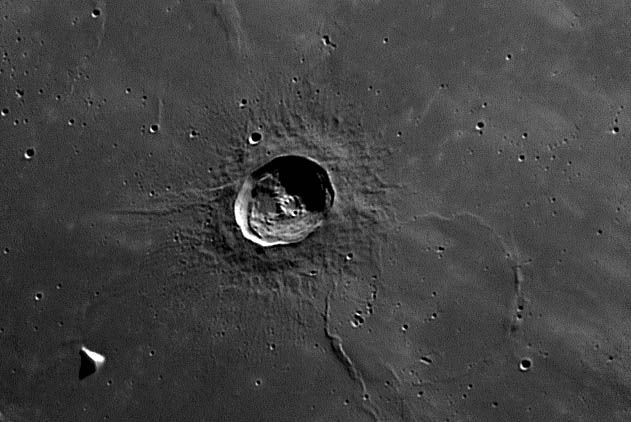Memory of a Crater

Explanation:
Craters form on an existing surface, which will continue to change
in the future. For example, the 30 km wide Lambert is excavated into Mare Imbrium
lavas, and the crater’s ridges of continuous ejecta visibly lie on the mare
surface. A few subsequent random impacts have formed craters on these deposits, and
at least two small younger craters are seen inside Lambert. The daubs of grayish
rays and perhaps a cluster of secondary craters to the right of Lambert and another
at the center left edge of the image demonstrate that ejecta from Copernicus has
also slightly modified this area. But all landscape modifications are not as modest.
Consider the ghostly ring south of Lambert. This feature (Lambert R - R for ruin)
could be some exotic volcanic structure, perhaps similar to a terrestrial ring dike,
but more likely it is the remnant of a hapless impact crater that formed on a lower,
intermediate level of Imbrium’s lavas, before the basin was filled with its
final thickness of lava. The rising level of Imbrium lavas must have climbed the
flanks of the crater and, finally reaching a low spot, cascaded down into the 55
km wide pit. It appears that the mare lavas completely inundated the crater, leaving
only a few low arcuate ridges, joined by wrinkle ridges. There is one other unusual
feature to note – on the left side of Lambert there is a flat, narrow ridge
about 40 km long that feathers into the surrounding lava. The origin of this flow-like
ridge is a mystery.
—
Chuck
Wood
Technical Details:
Nov 5, 2004.Starmaster 18" Newt. Reflector , FL=8200mm, no filters, DMK-21F04 Firewire
camera, 30FPS, stack of 804 frames from 1250.Related Links:
Related Links:
Wes' Web site
Rukl Plate 20
